Shinzo Abe: The legacy of Japan's longest-serving PM
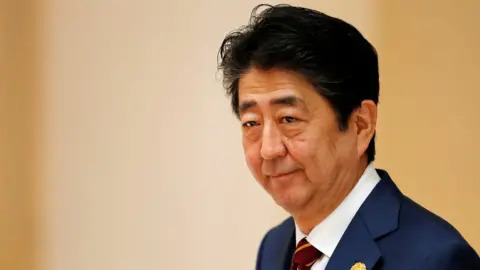 Reuters
ReutersShinzo Abe, Japan's longest-serving prime minister, was known for his hawkish foreign policy and a signature economic strategy that popularly came to be known as "Abenomics". A highly popular, and a highly controversial politician, the 67-year-old Abe led the Liberal Democratic Party (LDP) to victory twice.
His shocking death harkens back to images of the violent days in pre-war Japanese politics, when political assassinations were, if not commonplace, not unheard of. A string of political assassinations were part of Japan's march towards WWII.
As a popular and divisive politician, it was part of his trade to stir up strong emotions among the masses. Abe knew from childhood that those masses are not always friendly, and that he had to fight back against criticism.
Abe's first stint as prime minister was brief - for a little over a year starting in 2006 - and controversial. But he made a surprising political comeback in 2012, staying in power until 2020 when he resigned for health reasons.
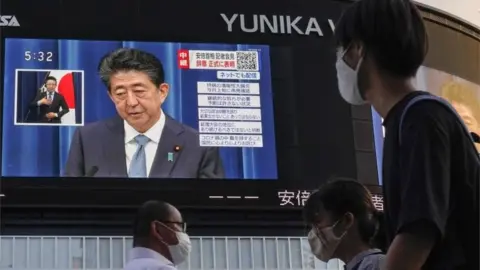 EPA
EPAJapan was in a recession when he began his second term and his economic policy was credited with helping return growth to a faltering economy.
He oversaw Japan's recovery from a massive earthquake and tsunami in Tohoku in 2011, which killed nearly 20,000 people and led to a meltdown of the Fukushima nuclear reactors.
Abe also had his unexpected moments, such as popping up dressed as Super Mario at the Rio Olympics closing ceremony ahead of the 2020 Tokyo Games.
When he stepped down after weeks of speculation, he revealed he had suffered a relapse of ulcerative colitis.
He was succeeded by close party ally Yoshihide Suga, but was still seen as a powerful figure in Japanese politics.
Rise to power
As the son of former foreign minister Shintaro Abe and grandson of former prime minister Nobusuke Kishi, Abe was born into a political dynasty. He felt his mission was to continue the task of his ancestors - to make Japan strong, great, and a force to be reckoned with on the international stage.
He looked up to Kishi, who strove to strengthen Japan's economic rule over China and Manchuria during World War II, and then was instrumental in creating the political dominance of the Liberal Democratic Party (LDP). Abe's aversion to protesters may have its roots in how his revered grandfather was driven from power, following a huge anti-government protest in 1960.
Abe was first elected to parliament in 1993, and in 2005 he became chief cabinet secretary. His rise to the top came swiftly as he became Japan's youngest post-war prime minister in 2006.
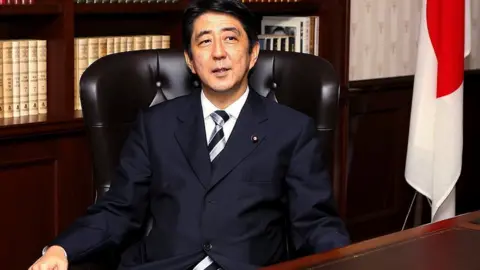 Getty Images
Getty ImagesBut a series of scandals - including the government's loss of pension records, affecting about 50 million claims - hit his administration hard.
A heavy loss for the LDP followed in upper house elections in July 2007, and in September of that year he resigned due to ulcerative colitis.
But then in 2012, Abe returned as prime minister, saying that he had overcome the disease with the help of medication.
He was subsequently re-elected in 2014 and 2017, becoming Japan's longest-serving prime minister.
His popularity fluctuated, but he remained largely unchallenged due to his influence in the LDP, which amended its rules to allow him to serve a third term as party leader.
A controversial nationalist
With his hawkish stance on defence and foreign policy, Abe repeated the importance of being an equal ally and partner with the US and other Western powers.
This fed into his long-held goal of revising Japan's post-war pacifist constitution so it could finally become a "normal country". Conservatives see the constitution - drafted by the US - as a reminder of the humiliating defeat of Japanese troops in WWII.
The influence of his grandfather also fed into Abe's wariness of China emerging as the dominant force in Asia, reinforcing his conviction that Japan needed to pull its weight and become a military force to defend itself.
These nationalistic and militaristic platforms were deeply divisive, horrifying parts of the population who cherish the pacifist constitution, while giving voice and even credibility to those blatant revisionist and nationalist groups and sentiments which for a long time in post-war Japan used to be a minority and only spoken in hushed tones.
His nationalist views have often raised tensions with China and South Korea, particularly after his 2013 visit to Tokyo's Yasukuni shrine, a controversial site linked to Japan's militarism before and during WWII.
Repeated visits also irked left-wing factions in Japan, who viewed it as an attempt by Abe to whitewash Japanese atrocities during the war.
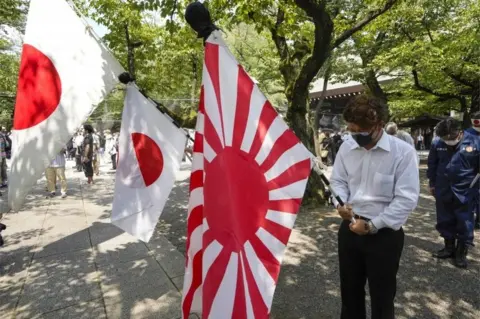 EPA
EPAIn 2015, he pushed for the right to collective self-defence, enabling Japan to mobilise troops overseas to defend itself and allies under attack.
Despite opposition from Japan's neighbours and even the Japanese public, Japan's parliament approved this controversial change.
His larger goal of revising the constitution to formally recognise Japan's military remains unfulfilled, and continues to be a divisive topic in the country.
He was also unable to secure the return of what Japan refers to as the Northern Territories - a chain of disputed islands off the northern prefecture of Hokkaido that are claimed by both Japan and Russia.
Abe's rapport with former US president Donald Trump was credited with shielding Japan from crippling US-led trade tariffs, and having to fork out more money to support the presence of US troops in the country.
Tackling economy and Covid-19
He spearheaded "Abenomics" policies, a comprehensive policy package aimed at making Japan strong by reviving the economy from the doldrums of deflation, while maintaining fiscal discipline.
The popularity of these policies led to Abe and the LDP's return to power in 2012. But his efforts faced a major challenge when the country again went into recession in the spring of 2020. That and other slowdowns raised questions about the effectiveness of his approach.
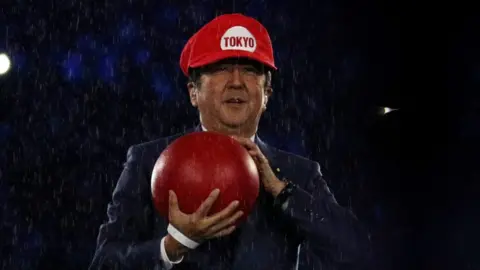 Reuters
ReutersAbe's popularity was further hit by concerns over his handling of the Covid-19 pandemic.
Critics believe his campaigns aimed at boosting domestic tourism contributed to a resurgence of infections.
They also say other promises of Abenomics - such as empowering women in the workforce, tackling nepotism and changing unhealthy work cultures - remained unfulfilled.
Internationally, he has been credited with holding the Trans-Pacific Partnership - a massive trade agreement between 11 countries - together, following an abrupt withdrawal by the US under Mr Trump's administration.
Resignation and death
Abe's resignation announcement led to an internal struggle among LDP factions, because he declined to name a successor.
He was eventually succeeded by Yoshihide Suga. But Abe continued to hold sway over domestic politics in Japan, even after Suga was replaced by current prime minister Fumio Kishida.
On 8 July, Abe was in the southern city of Nara campaigning on behalf of a candidate running for Japan's upper house.
He was delivering a speech when he was shot by a gunman - a 41-year-old who is believed to be a former member of the Self-Defense Force, Japan's equivalent of a navy.
According to NHK and other news reports, the suspect said he was "dissatisfied with Abe" but that "it has nothing to with political grudges".
Abe was conscious when taken to hospital, but died later from his injuries.
He leaves his wife, Akie, a Japanese radio DJ who he married in 1987.
Additional reporting by Andreas Illmer
